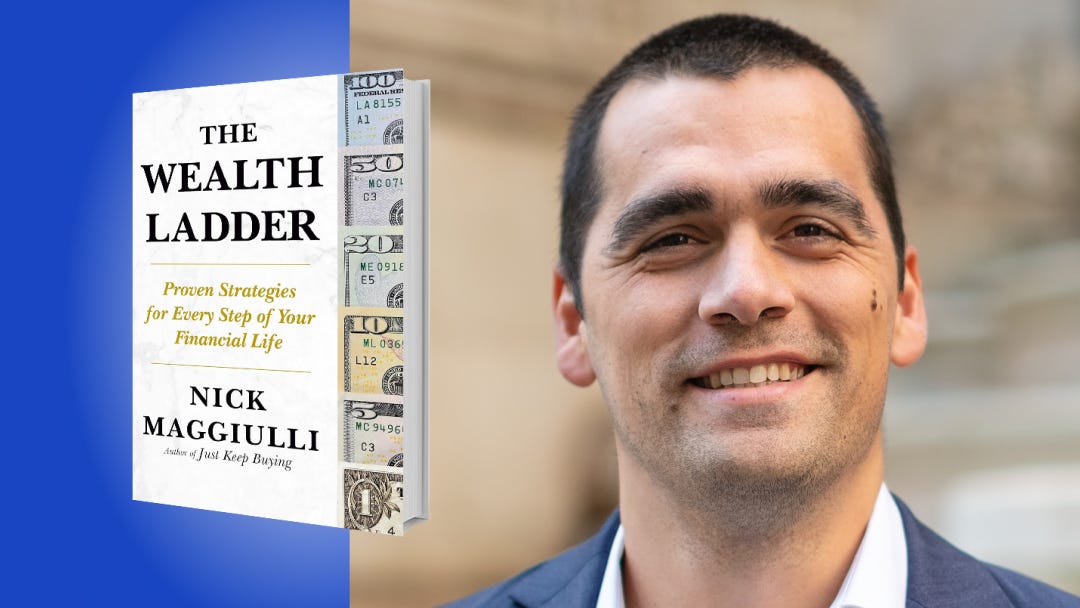Want to Get Rich? Stop Taking Advice Meant for Millionaires
Here's why your wealth-building tactics should change as your net worth grows.
Listen now on Apple Podcasts or Spotify:
Maybe wealth shouldn’t be measured by how much you’re able to hoard, but by how much you’re able to spend. After all, money is there to be used, enjoyed, and given away generously—otherwise, what’s the point? Finance writer Nicholas Maggiulli has a new book called The Wealth Ladder, in which he argues that building financial freedom isn’t about budgeting harder or dreaming bigger—it’s about recognizing where you are on the wealth spectrum, and then following the right strategy for that level. Whether you’ve got ten bucks in the bank or ten million, Nick has a plan to help you enjoy what you’ve got without risking your future.
1. Wealth isn’t a straight line; it’s a ladder.
For most people, $100 million would fundamentally transform their lifestyle. But for someone like Jeff Bezos, $100 million wouldn’t even register. This simple observation has profound implications for understanding wealth.
When I say “wealth,” I am referring to your net worth, or your assets minus your liabilities. That’s everything you own—property, financial assets, and cash—minus everything you owe, such as your mortgage, student loans, or credit card debt. We’ve assumed that more wealth is better and that it can solve all of our problems. We’ve also assumed that more wealth means more personal consumption. Unfortunately, this is only true in the extremes.
The person with $100,000 can afford a lifestyle that is quite different from the person with only $1,000. However, the person with $500,000 lives nearly identically compared to the person with $400,000. Though these two people are separated by $100,000, they likely shop at similar stores, drive similar cars, and live in similar homes. In this sense, our enjoyment of wealth isn’t something that goes up with every additional dollar we get, but something that increases in steps.
Wealth isn’t a straight line; it’s a ladder. And each rung of this ladder corresponds with a wealth level that will impact nearly every facet of your financial life. From how you spend money, to how you earn it, and how you invest it, each level of the Wealth Ladder is unique:
Level 1 (<$10k)
Level 2 ($10k-$100k)
Level 3 ($100k-$1M)
Level 4 ($1M-$10M)
Level 5 ($10M-$100M)
Level 6 (>$100M)
These levels are separated by a factor of 10, as this corresponds to the increase in wealth required to create a significant lifestyle change.
Financial strategy changes as you move up the Wealth Ladder. The strategy to get you from Level 1 to Level 2 will be fundamentally different from the strategy to get you from Level 5 to Level 6. While budgeting can be useful for someone in Level 1, it likely won’t make a difference for someone in Level 6. Similarly, starting and scaling a business could help someone in Level 6 build more wealth, but probably isn’t the right strategy for someone in Level 1. The Wealth Ladder will provide different financial advice based on where you are on your financial journey.
In this way, the Wealth Ladder is a grand unifying framework that will fundamentally change how you think about wealth and how to build it. Your shift in thinking will influence how you choose a career, take risks, and, ultimately, live your life. The difference between those who build wealth and those who don’t isn’t necessarily how hard they work. Rather, it’s what strategies they follow and where they focus their time and energy.
2. The 0.01 Percent Rule.
The 0.01 Percent Rule says you should spend based on your wealth, not your income. Income fluctuates. Wealth is steadier, so spending from it lets your lifestyle grow gradually, without risking what you’ve built. The 0.01 Percent Rule is simple: take your net worth, multiply it by 0.01 percent (or divide by 10,000), and that’s your daily spending allowance—on top of your income. If you have $100,000 in wealth, you could spend an extra $10 per day. If you have $1,000,000 in wealth, you can spend an extra $100 per day. And so forth.
On the Wealth Ladder, this means that every wealth level corresponds to a category of spending freedom. In Level 2 ($10k-$100k), you would start to have grocery freedom, meaning you can buy what you want at the grocery store. This is exactly what the 0.01 Percent Rule allows. The difference in price between factory farm eggs and cage-free eggs will only be a few dollars. This difference is roughly the amount of extra spending freedom you get in Level 2.
“Every wealth level corresponds to a category of spending freedom.”
This continues up the Wealth Ladder. In Level 3 ($100k-$1M), you start to have restaurant freedom. You can buy what you want at restaurants. And in Level 4 ($1M-$10M), you start to get travel freedom; you can travel how and where you want.
Of course, I don’t recommend using the 0.01 Percent Rule to spend all your income and what your wealth generates. However, if you are saving money and building wealth over time, the 0.01 Percent Rule can allow you to enjoy more of your money without going overboard.
This week, Book of the Day is brought to you by This Isn't Working, from leadership expert Meghan French Dunbar, showing business leaders and workers how to boost performance while improving workplaces for women, and, ultimately, everyone. Get your copy today.
3. The importance of income-producing assets.
Do you know what separates those in Levels 1-3 from those in Levels 4-6 on the Wealth Ladder in terms of their investments? Income-producing assets. I’m talking about things like stocks, bonds, real estate, private businesses, and more. These are assets that generate income, making their owners richer.
On average, households in Levels 1 to 3 of the Wealth Ladder have less than 25 percent of their wealth in income-producing assets. However, households in Levels 4-6 have more than 50 percent of their wealth in income-producing assets. This is the biggest differentiator in terms of how households allocate their assets across the Wealth Ladder.
As a result, households higher on the Wealth Ladder tend to have higher incomes than those lower on the Wealth Ladder. While some of this difference is due to higher-paying jobs, some is related to the assets these households own. While having more income-producing assets in your portfolio isn’t guaranteed to make you rich, it’s not a bad place to start.
4. How to choose a career.
When it comes to choosing a career, I like to use what I call the Golden Intersection. That is the combination of what you’re good at, what you’re interested in, and what people will pay you for. If you can find a vocation that has all three of these qualities, then you’ve hit the jackpot.
You may not find this right away, so what should you focus on in the meantime? I recommend doing something that you’re good at that people will pay you for. If you work on something you are good at, you may find yourself growing interested in it. If not from the work itself, then from the praise you get along the way.
“If you work on something you are good at, you may find yourself growing interested in it.”
This is how I got into writing. I was okay at it initially, but the praise I received for some of my work encouraged me to keep doing it. Today, I enjoy writing more than I ever thought possible.
When it comes to choosing a career, find ways to work toward the Golden Intersection. You may not be able to do this in Level 1 of the Wealth Ladder, but as you gain more financial security, you can start taking more risks and find the career that is right for you.
5. The wealth amplification effect.
The wealth amplification effect is the idea that all the non-financial parts of your life become more amplified as you climb the Wealth Ladder. If you are in Level 1 or Level 2, most of your problems in life could probably be solved by having more money. As you climb the Wealth Ladder, money becomes less useful for solving your problems. You can’t write your kids a check to make them love you. You can’t buy a new cardiovascular system after neglecting your health for years. Because of this, you should spend even more time focusing on the non-financial aspects of your life as you build wealth.
This is easy to overlook because money is measurable, while the many other types of wealth in life are not. If you do climb the Wealth Ladder, don’t forget why you started climbing in the first place.







I love your core insight here, Nick, which I have not read elsewhere — the right strategy for building wealth and budgeting your life changes over time as you move up the "wealth ladder," as you call it. There is a lot of value in understanding how those strategies change as you make progress.
I had a conversation with Scott Galloway about his book The Algebra of Wealth in which he made two critical related points: (1) very few people really understand that exponential nature of compounding investment returns, and (2) young people generally do not appreciate that the TIME they have in front of them — 50+ years in which investments can compound — is itself an asset. Because of the incredible power of compounding returns, the benefit of *saving* early in one's life and putting those savings into the stock market (ideally Nasdaq 100 ETFs rather than S&P which have and will generate much higher returns without higher risk, in my humble opinion) is disproportionately high in our early decades.
Of course most of us have multiple decades in front of us, hopefully, and that is still plenty of time to enjoy extraordinary compounding.
I would add to this — the most important thing that money buys is the *freedom* to spend your time doing the things that you most care about. Hopefully endeavors that connect you with other people, add value to the world, and lead to a personal learning journey.
Great insights, Nick, thank you!
Here's my convo with Galloway for those interested:
https://podcasts.apple.com/us/podcast/algebra-of-wealth-scott-galloways-formula-for/id1482067226?i=1000654295433
I’ve been reading Nick’s work on ofdollarsanddata for years. His working style and use of data has always been intriguing to me. From Just keep buying and now the wealth ladder are books I recommend often.